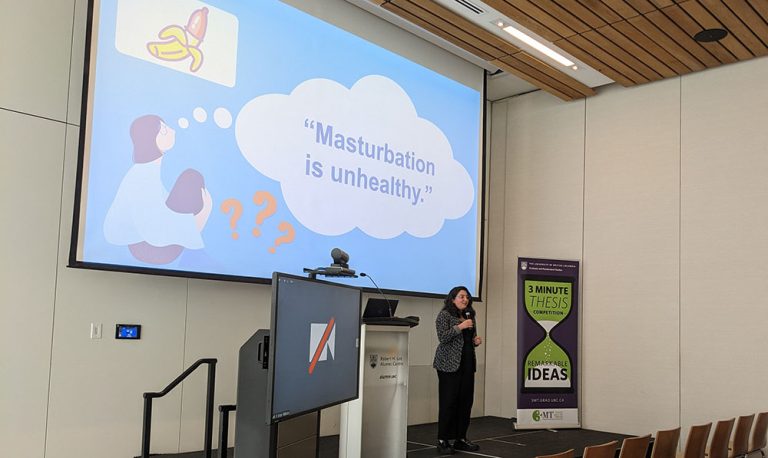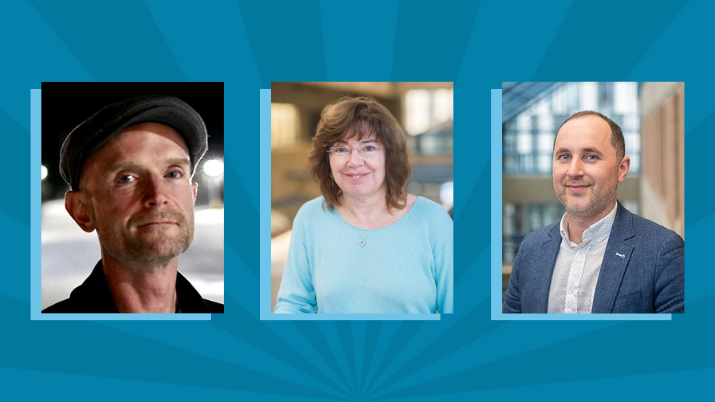

Kiarah O’Kane presenting at UBC’s 3MT Competition.
3MT celebrates research and science communication skills.
Kiarah O’Kane (she/they), a clinical psychology graduate student at UBC, earned a top spot in UBC’s Three Minute Thesis (3MT) competition.
Hosted by UBC’s graduate and postdoctoral studies, graduate students present complex research ideas on one slide in three minutes at UBC’s 3MT competition.
Kiarah presented their thesis Do you mythunderstand me? Sexuality myths and sexual outcomes. This research explores the role of sexuality misinformation and its impact on beliefs and sexual well-being.
Now, Kiarah will advance to the Western Regional 3MT Competition where the best of Western Canada’s graduate students will take the stage and present their thesis in three minutes. The 2023 Western Regional 3MT Competition is on May 25, 2023 at the University of Saskatchewan.
Through their research, Kiarah examines the modifiable factors impacting the sexual well-being of LGBTQ+ individuals and couples. Kiarah uses psychophysiological and eye tracking methods to explore gender and sexual orientation differences in sexual response patterns. The ultimate goal of Kiarah’s work is to develop accessible interventions for bolstering the sexual well-being of LGBTQ+ individuals and couples.
“It is really special to me to see sex research being valued by the broader scientific community! During the 3MT competition, I had so many amazing conversations with other participants about sex research, and it was great to see so much interest in sexual well-being from so many other incredible scientists.”
Kiarah is co-supervised by Dr. Samantha Dawson, assistant professor in UBC’s department of psychology and Dr. Katrina Bouchard, assistant professor in UBC’s department of obstetrics and gynaecology.
“Kiarah is everything one could want in a graduate student—intellectually curious, engaged, and enthusiastic! A core focus of Kia's research is to conduct research that best captures the diversity inherent in sexuality and as a result produce research that generalizes to all people, not just those with majoritized identities.”
Kiarah joins us for a Q&A where they discuss their research and its impact—and why science communication is increasingly important. Kiarah also offers advice for other graduate students considering taking part in the 3MT.
Can you tell us about your research—and its impact?

Kiarah O’Kane
My Master’s thesis research focuses on understanding which demographic groups are most at risk for holding inaccurate beliefs about sexuality, and identifying how endorsing myths about sexuality is linked to sexual outcomes. This is with the aim of determining which groups could potentially benefit most from knowledge translation initiatives about sexuality. The findings from my research will allow sex researchers to deliver sexuality education initiatives to the people who are most at risk of holding inaccurate beliefs about sexuality that could be detrimental to their sexual outcomes!
Was it difficult to distill your research down to three minutes?
On the one hand, it was difficult to summarize my entire Master’s thesis into such a short presentation given that there are so many important details that are part of the research. It can be tricky to know exactly what an audience needs to know about your research in order to fully understand what you did and why it is important. On the other hand, sexuality and sexual education are important parts of many people’s lives, so I found that I was able to make my research relatable to a wide audience.
Why is it important to communicate this research clearly and concisely?
Knowledge translation is a key part of ensuring that your research findings are accessible and beneficial to the general public. Given that a big focus of my research is to improve the sexuality knowledge of the general public, it is really important that I am able to communicate my research findings in an accessible way. 3MT was the perfect setting for me to practice concise knowledge translation for an audience with a wide-range of scientific backgrounds!
Do you have advice for other graduate student researchers considering entering the 3MTs?
My advice is to just go for it! It felt really scary to present research in a way that is quite different from how I usually present it (e.g., at conferences, with lots of details), but 3MT was a great opportunity to push myself outside of my comfort zone and develop a different facet of my presentation skills. Another piece of advice is to focus on telling a story with your research and making it relatable to your audience. This is your chance to really emphasize why the work you do is important!
What does it means to you personally to receive this recognition for your work and to advance to the Western Regional Competition?
It is really special to me to see sex research being valued by the broader scientific community! During the 3MT competition, I had so many amazing conversations with other participants about sex research, and it was great to see so much interest in sexual well-being from so many other incredible scientists. Advancing to the Western Regional Competition will be another incredible opportunity to disseminate information about sexuality to the scientific community, and I am so excited! I cannot wait to see the other incredible research being done across Western Canada as well.
Despite the importance of sexuality for well-being, many people receive a lack of information—or even misinformation—about sexuality. When people lack access to accurate information about sexuality, they may develop inaccurate beliefs, which could impact their sexual well-being. Identifying who is most likely to hold false beliefs about sexuality is crucial to targeting information to those who need it most. In this study, 4428 people completed a survey reporting on their demographics, endorsement of sexuality myths, and sexual outcomes. Results revealed that being assigned male at birth, identifying as cisgender, identifying as heterosexual, having more conservative political views, being more religious, and having ever taken a human sexuality course in college all predicted greater sexuality myth endorsement. Higher sexuality myth endorsement predicted poorer sexual outcomes. These results will allow researchers to target knowledge translation initiatives to people most at risk of holding beliefs detrimental to their sexual well-being.
The Three Minute Thesis (3MT) is an academic competition that assists current graduate students with fostering effective presentation and communication skills. Participants have just three minutes to explain the breadth and significance of their research project to a non-specialist audience. Founded by the University of Queensland in 2008, the popularity of the competition has steadily increased and 3MT competitions are now held in over 350 universities across 59 countries worldwide. UBC, one of the first universities in North America to host a 3MT competition, has been presenting 3MT since 2011.


